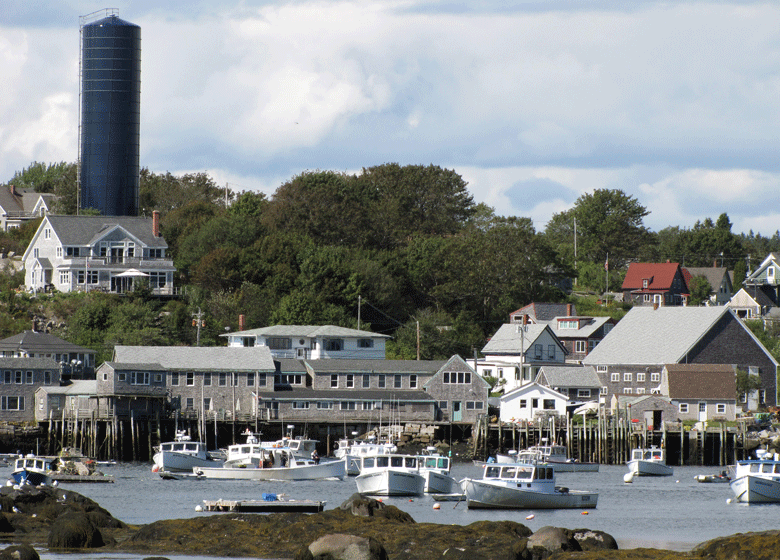We all, no doubt, have a vivid memory of the spring of 2020. Life changed radically as we adapted to the reality of a pandemic and how to avoid getting or spreading COVID-19.
For me, the March 15 vote by the North Haven Select Board stands out. In a statement raising more questions than it answered, the board warned: “People who do not reside on the island full-time may not travel to the island due to the significant increase in risk associated with the transmission of COVID-19.”
Shutting down borders and avoiding non-essential travel were policies at that time. But how could it come to be that island officials would see those who were likely part-time neighbors as interlopers, and in the heat of COVID fear, identify them as the most likely conduit for bringing the virus to the islands?
From the survival of the species perspective, humans are wired to seek attachment…
Isolation worked as protection from COVID, but unfortunately fell in line with an attitude already displayed by national leadership—divisiveness as acceptable or even advantageous, a rejection of collaboration. North Haven’s was, at best, a knee-jerk reaction, “better angels” set aside.
From the survival of the species perspective, humans are wired to seek attachment; with it, they thrive. Feeling “held”—which can mean feeling connected, understood, seen, and valued—brings out the best in us. How quickly the benefits of a connected community got set aside in spring 2020, seemingly better served with assumptions and finger-pointing.
None of us knew a lot about COVID at that point. What we were experiencing was unexpectedly high numbers of people becoming ill, hospitalized, and dying.
One of the biggest fears for island communities was their limited ability to care for people requiring medical attention. As Rob Snyder, then-president of the Island Institute wrote, it was understandable to worry about health services as the population on Maine’s islands is older, and COVID has a disproportionate impact on seniors.
But he also recognized the effect North Haven’s negative-sounding message had: “For seasonal residents who thought they were neighbors and friends, the move to close off the island may seem like distrust and animosity, and could have a long-term detrimental impact on the community’s social fabric.”
On March 19, North Haven rescinded the ban. Rick Lattimer, town administrator, issued a clarification. New policies included making sure the medical center and EMTs were able to test, and those who had exposure would self-quarantine. People arriving on North Haven would quarantine at their island home for two weeks.
Contractors coming to the island would scale back or postpone jobs. Penobscot Island Air was screening passengers, crew, and support staff. Lattimer explained the restriction of all non-essential travel had not been meant to harm anyone.
The Working Waterfront in April featured an interview by Tom Groening, editor, with four island-based columnists. One columnist worried that a seasonal resident, opening their house that spring, “greeted the plumber as he came to turn on their water” and concluded, “It isn’t responsible to risk infecting us.”
Another columnist warned, “If anyone who has not been here thinks they’ll just come to the island to find sanctuary from the virus, I would urge them not to come. Yes, they might pay more taxes than I do. Yes, they have a right to be in any property they own. But they are endangering lives by coming here… Most of us miss you and can’t wait to see you, but please don’t burden us with a visit at this time.”
By May, the looming summer intensified islander fears.
A column headlined, “Our island communities value our seasonal residents, but we worry,” appeared in this newspaper, written by the co-chairs of the Maine Islands Coalition, Donna Weigle and Roger Berle. They acknowledged that tourism and tax dollars from summer residents play a large part in boosting island economies. But, anticipating summer, there were concerns about demands on island grocery stores, medical care, and EMS services.
Summer residents and visitors were asked to stay away from the islands for now: “We are sure no one wants to be the person who brings the virus to an island.”
My own experience that summer on Vinalhaven was that those from away got the message: don’t come and put a strain on our limited resources, don’t come and not take COVID precautions seriously. Island concerns were understandable and public health guidelines important.
COVID science—how it was transmitted and how to protect from it—was nascent. Understandably, people wanted to feel some control of this mysterious and deadly pandemic.
Yet some initial attempts strained community ties. An approach of collaboration and inclusiveness would have best honored the true interdependency of seasonal and year-round residents. Meetings on Zoom might have been utilized.
But that March, people felt pressured to act after earlier, more critical delays by the government. Especially on a local level, we all benefit when concerns and responses are calmly shared in respectful dialogue. Hard as it is during a crisis, we need to stay alert to possible over-reactions and remember that anxiety and fear can affect thoughts and behaviors.
As Rob Snyder reminded us: “It is important that we pull together, rather than create divides. Our actions today will speak volumes on how we interact with each other the next time we need the care and support of our neighbors.”
Tina Cohen is a therapist who lives seasonally on Vinalhaven.





